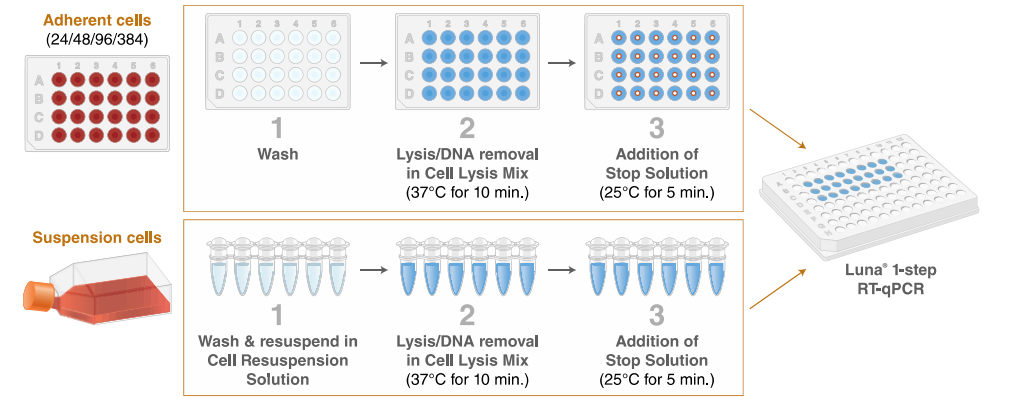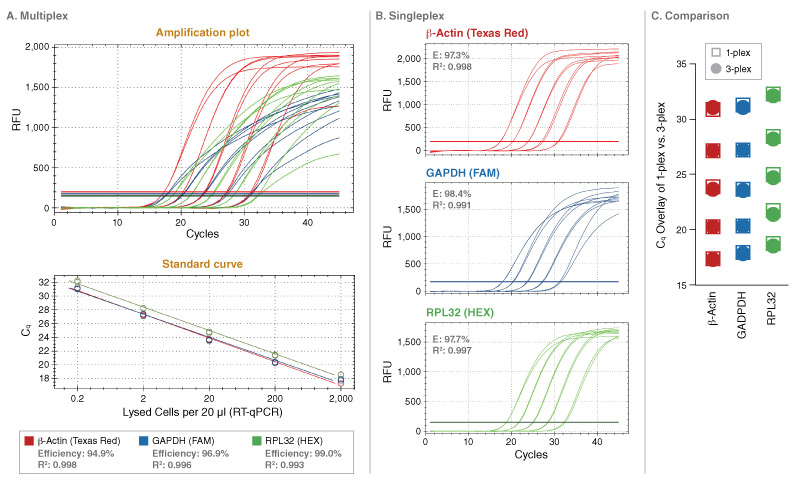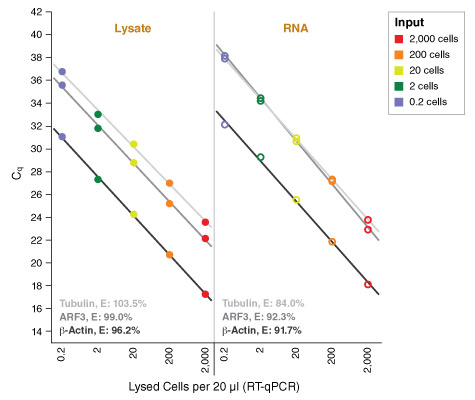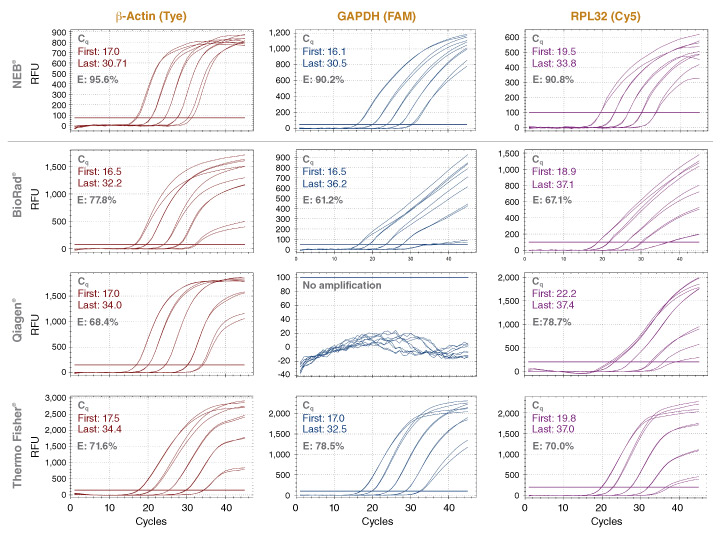Luna® Cell Ready Probe One-Step RT-qPCR Kit
Product information| Code | Name | Size | Quantity | Price | |
|---|---|---|---|---|---|
E3031S |
Luna Cell Ready Probe One-Step RT-qPCR Kit |
100 + 500 rxns | - | Unavailable in your region |
Luna® Cell Ready Probe One-Step RT-qPCR Kit
Catalog #E3031
Product Introduction
Go direct from cells to RNA quantitation without purification
- Contains reagents for 100 lysis preps and 500 one-step RT-qPCR reactions (probe)
- Effective cell lysis preparation from 10 to 100,000 cells across numerous cell lines
- Coordinated cell lysis, RNA release, and genomic DNA removal in a fast 15-minute protocol
- Features Luna WarmStart® RT paired with Hot Start Taq for increased thermostability and room temperature setup
- Additional lysis preps available: Luna Cell Ready Lysis Module (NEB #E3032)
- Product Information
- Protocols, Manuals & Usage
- Tools & Resources
- FAQs & Troubleshooting
- Citations & Technical Literature
- Quality, Safety & Legal
- Other Products You May Be Interested In
Product Information
Description
The Luna Cell Ready Probe One-Step RT-qPCR Kit provides all the necessary components for direct, probe-based RNA detection and quantitation, bypassing the need for RNA extraction and purification. The Luna Cell Ready Probe One-Step RT-qPCR Kit contains two modules: 1) the Luna Cell Ready Lysis Module (NEB #E3032S) and 2) the Luna Universal Probe One-Step RT-qPCR Kit (NEB #E3006L).
Cell cultures are often analyzed for gene expression or treatment responses as a proxy for a living organism. Traditionally, RNA is extracted and purified from treated cells via column-based or chemical methods. Coordinating the actions of DNase I and the Luna Cell Ready Protease, the Luna Cell Ready Lysis Module offers a simple alternative workflow resulting in effective cell lysis, RNA release, and genomic DNA removal simultaneously in a 15-minute protocol. The Lysis Module includes a unique Luna Cell Ready RNA Protection Reagent that maintains RNA integrity during cell lysis. The lysis capacity spans 10 -100,000 cells in a 50 µl lysis reaction. Up to 2 µl of lysate (equivalent to RNA from 0.2 - 4,000 cells) can be transferred into 20 µl downstream RT-qPCR reactions. Similar to other Luna products, the lysis buffer includes an inert blue tracking dye for visual assistance throughout the workflow.
The Luna Universal Probe One-Step RT-qPCR Kit is compatible with probe-based real-time quantitation of target RNA sequences via multiple fluorescence channels of most real-time instruments. In the Luna Universal Probe One-Step RT-qPCR Kit, Hot Start Taq DNA polymerase is combined with a novel Luna WarmStart Reverse Transcriptase, allowing dual control of enzyme activity via reversible, aptamer-based inhibition. The Luna Universal Probe One-Step RT-qPCR Kit can detect and quantitate RNA transcripts (via a singleplex or multiplex reaction) in the cell lysate prepared directly from the Luna Cell Ready Lysis Module.
This table lists cells lines that are compatible with the Luna Cell Ready Lysis Module. It includes results seen using a 5-log dilution series (100,000 - 10 cells per 50 µl lysis reaction) and subsequent detection of 1 µl of lysate in a 20 µl one-step RT-qPCR reaction. For each cell line, linear results are indicated in the final column. In addition, some insect cell lines have been tested and are compatible.
Table 1: Validated Cell Lines
| Cell line | Property | Species | Cell number per 50 μl lysate |
|---|---|---|---|
| A549 | Adherent | H. sapiens, Lung, carcinoma | 10 - 100,000 |
| HEK293 | Adherent | H. sapiens, Kidney | 10 - 100,000 |
| HeLa | Adherent | H. sapiens, Cervix, adenocarcinoma | 10 - 100,000 |
| HepG2 | Adherent | H. sapiens, Liver, carcinoma | 10 - 1,000 |
| NCI-H460 | Adherent | H. sapiens, Lung, carcinoma | 10 - 100,000 |
| SK-N-SH | Adherent | H. sapiens, Brain, Neuroblastoma | 10 - 10,000 |
| U2Os | Adherent | H. sapiens, Bone, osteosarcoma | 10 - 100,000 |
| Jurkat | Suspension | H. sapiens, T lymphocyte, leukemia | 10 - 100,000 |
| K-562 | Suspension | H. sapiens, Lymphoblast, leukemia | 10 - 100,000 |




- This product is related to the following categories:
- Luna® qPCR & RT-qPCR,
- PCR, qPCR & Amplification Technologies,
- This product can be used in the following applications:
- qPCR & RT-qPCR,
- DNA Amplification, PCR & qPCR
Properties & Usage
Materials Required but not Supplied
- Phosphate-buffered saline (PBS)
- Target-specific primers
- Cells
- Eppendorf tubes
- PCR strip tubes
- PCR plates
- qPCR instrument
- Pipettors and pipette tips (to minimize cross contamination, filter tips should be used)
Protocols, Manuals & Usage
Protocols
Manuals
Application Notes
Tools & Resources
Web Tools
FAQs & Troubleshooting
FAQs
- What cell lines are compatible with the Luna Cell Ready Probe One-Step RT-qPCR Kit?
- How many cells should I use for reliable detection?
- How many cells should I seed into cell culture plates to achieve optimal detection?
- Can cryopreserved cell lines or pelleted cells stored at -80°C be used with this kit?
- How can lysis efficiency be determined?
- Why is it important to evaluate RNA damage or inhibition during cell lysis and one-step RT-qPCR detection?
- What is the “Luna Cell Ready RNA Protection Reagent” and when should it be used?
- Should I include a No-RT control reaction?
- Will the blue tracking dye interfere with detection?
- Is cell washing prior to lysis necessary?
- Which lysis format should I use?
- What protocol should be used for cell lysis? Can cells be lysed at room temperature or using a short protocol?
- When using cell lysates generated from Luna Cell Ready Lysis Module, can RT-qPCR experiments be set up at room temperature?
- How much cell lysate should I use as input? (NEB #3031)
- Can I use the cell lysates generated from the Luna Cell Ready Lysis Module for two-step RT-qPCR?
- Why does the Luna Cell Ready Probe One-Step RT-qPCR Kit contain more RT-qPCR reactions than lysis reactions?
- If either the Luna Cell Ready Lysis Module or Luna Cell Ready Probe One-Step RT-qPCR Kit runs out can I order them separately?
- How can I obtain more technical help related to Luna Cell Ready Probe One-Step RT-qPCR Kit?
Citations & Technical Literature
Citations
Additional Citations
Quality, Safety & Legal
Quality Assurance Statement
Quality Control tests are performed on each new lot of NEB product to meet the specifications designated for it. Specifications and individual lot data from the tests that are performed for this particular product can be found and downloaded on the Product Specification Sheet, Certificate of Analysis, data card or product manual. Further information regarding NEB product quality can be found here.Specifications
The Specification sheet is a document that includes the storage temperature, shelf life and the specifications designated for the product. The following file naming structure is used to name these document files: [Product Number]_[Size]_[Version]Certificate Of Analysis
The Certificate of Analysis (COA) is a signed document that includes the storage temperature, expiration date and quality controls for an individual lot. The following file naming structure is used to name these document files: [Product Number]_[Size]_[Version]_[Lot Number]- E3031S_v1_10066858
- E3031S_v1_10067619
- E3031S_v1_10067909
- E3031S_v1_10068354
- E3031S_v1_10069113
- E3031S_v1_10070049
- E3031S_v1_10071523
- E3031S_v1_10072022
- E3031S_v1_10075779
- E3031S_v1_10075781
- E3031S_v1_10079683
- E3031S_v1_10084984
- E3031S_v1_10088148
- E3031S_v1_10094012
- E3031S_v1_10101788
- E3031S_v1_10107169
- E3031S_v1_10110737
- E3031S_v1_10120330
- E3031S_v1_10123094
- E3031S_v1_10140608
- E3031S_v1_10143238
- E3031S_v1_10149826
- E3031S_v1_10152464
- E3031S_v1_10160446
- E3031S_v1_10166372
- E3031S_v1_10173862
- E3031S_v1_10177190
- E3031S_v1_10181646
- E3031S_v1_10191586
- E3031S_v1_10237010
- E3031S_v1_10262323
- E3031S_v1_10275825
- E3031S_v1_10279042
- E3031S_v1_10297606
- E3031S_v1_10300294
- E3031S_v1_10302595
Legal and Disclaimers
Products and content are covered by one or more patents, trademarks and/or copyrights owned or controlled by New England Biolabs, Inc (NEB). The use of trademark symbols does not necessarily indicate that the name is trademarked in the country where it is being read; it indicates where the content was originally developed. The use of this product may require the buyer to obtain additional third-party intellectual property rights for certain applications. For more information, please email busdev@neb.com.This product is intended for research purposes only. This product is not intended to be used for therapeutic or diagnostic purposes in humans or animals.
New England Biolabs (NEB) is committed to practicing ethical science – we believe it is our job as researchers to ask the important questions that when answered will help preserve our quality of life and the world that we live in. However, this research should always be done in safe and ethical manner. Learn more.
Licenses
Nucleic acid-based aptamers for use with thermophilic DNA polymerases and reverse transcriptases are licensed exclusively by New England Biolabs, Inc. from SomaLogic, Inc. New England Biolabs, Inc. gives the Buyer/User a non-exclusive license to use the Luna® Cell Ready Probe One-Step RT-qPCR Kit for Research Use Only (RUO). Commercial use of this product may require a license from New England Biolabs, Inc. For additional information or to inquire about commercial use, please contact busdev@neb.com.Other Products You May Be Interested In
The supporting documents available for this product can be downloaded below.


